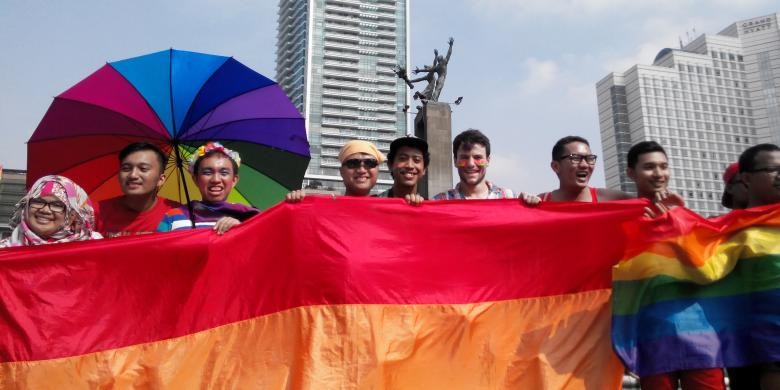Popular Reads
Top Results
Can't find what you're looking for?
View all search resultsPopular Reads
Top Results
Can't find what you're looking for?
View all search resultsAre Indonesians homophobic?
Claiming "neutrality" in hate crimes that target any vulnerable individual or minority group doesn't translate in the global digital era, and Indonesians would do well to remember that silence is complicity.
Change text size
Gift Premium Articles
to Anyone
I
ndonesia is a nation of homophobes. Anyone would be forgiven for drawing this conclusion following the recent social media spat between Indonesian and Thai users.
The flame war began when Indonesian netizens bullied, harassed and threatened a Thai same-sex couple over posting photos of their April 4 wedding on Facebook. By late last week, the couple’s Facebook account had garnered 445,000 comments and 40,000 shares.
Most of the comments from Indonesian users were homophobic, even if they didn’t know the couple personally. This only reaffirms the results of the recent Microsoft survey that put Indonesia among the rudest nations when it came to internet and social media use, ranking it 29th out of the 32 surveyed countries.
Any decent Indonesian would tell you that those commenters hardly represent the nation. Indonesians, by and large, are tolerant. We have to be. Our diversity, whether by race or ethnicity, religion, culture or language, and yes, sexual orientation, requires tolerance to ensure peaceful coexistence across the archipelago.
While this may be true, it raises the questions: Where are these people? Why aren’t we hearing their voices?
If half of Indonesians are homophobic and the other half aren’t but are keeping mum about it, the world would still regard Indonesians homophobic as a whole. This perception wouldn’t change even if we lowered the ratio to, say, just 5 percent homophobic, if the majority 95 percent stayed silent anytime the lesbian, gay, bisexual, transgender and queer (LGBTQ) community came under attack, whether in Indonesia, Thailand or anywhere else in the world.
Whatever the true extent of homophobia in this country, our silence makes us complicit in hate crimes that target LGBTQ people. The homophobic label slapped on Indonesia will stick for a long time, unless more of us speak up and change the global perception.
Some Indonesian users did speak up in defense of the Thai couple and even apologized on behalf of the nation. But their number was too small, so their voices were drowned out by the inimical noise from Indonesian homophobes.
We can claim that these hate-mongers have hijacked social media platforms, the most favored public space for expressing individual opinions. The intolerant among us are using the internet, particularly social media, very effectively to spread their messages of hate.
Sadly, most Indonesians couldn’t be bothered by the issue and preferred to mind their own business. But it is precisely our indifference, if not apathy, that has allowed intolerance to creep into our society in the last decade and it is now nearly reaching the point of no return. Intolerance has become a major problem, in Indonesia and globally, so that it’s practically open season for targeting almost every vulnerable or minority group imaginable, including ethnic and religious minorities and women: because we allowed it.
Surely Indonesians could and should do better than simply taking a laissez-faire approach and pointing their fingers at social media for allowing hate-mongers to dominate public discourse with their hateful messages.
More Indonesians could and should speak up to call out the haters, and prove to the world what we really stand for.










